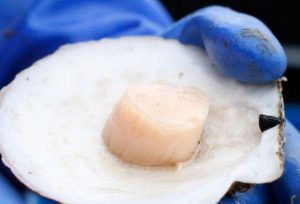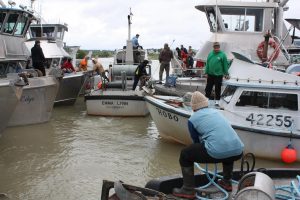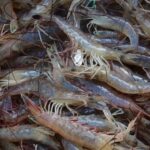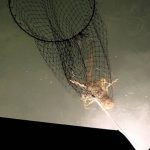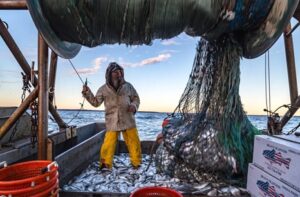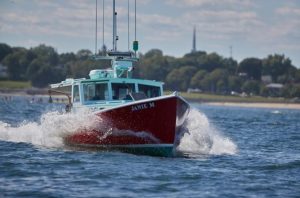FISH-NL makes formal request for Prime Minister to reopen Terms of Union
 FISH-NL makes formal request for Prime Minister to reopen Terms of Union
FISH-NL makes formal request for Prime Minister to reopen Terms of Union
FOR IMMEDIATE RELEASE Sept. 28th, 2017
The Federation of Independent Sea Harvesters of Newfoundland and Labrador (FISH-NL) has formally asked Prime Minister Justin Trudeau to reopen the province’s Terms of Union with regards to fisheries management.
“The Terms of Union must be revisited so that the principles of adjacency and historical attachment are made constitutional corner stones,” Ryan Cleary, President of FISH-NL, wrote in a Sept. 28th letter to the Prime Minister.
“No one minister or government should have such absolute control over Newfoundland and Labrador’s fishery fortunes.”
Most commercial stocks off Newfoundland and Labrador are at or near critical levels, with inshore harvesters and their enterprises starving for fish.
Despite that, first access to two stocks off Newfoundland and Labrador (including redfish in the Gulf, and Arctic surf clams on the Grand Banks) have been pledged to groups other than the inshore fleet, the engine of rural communities.
“The fact that the Minister of Fisheries and Oceans for Canada can dictate who has first access to Newfoundland and Labrador’s primary resource is wrong for the province, wrong for adjacent inshore harvesters and rural communities, and wrong for our future,” Cleary wrote.
FISH-NL recommends that all current quota allocations and management practices be reviewed to ensure that Newfoundland and Labrador inshore harvesters are benefitting from the adjacency principle, which was unanimously adopted last year by the Liberal Party of Canada.
“Our inshore harvesters must have first access to all adjacent fish resources,” Cleary wrote. “And, similar to the foundation of the Atlantic Accord with the offshore oil and gas industry, Newfoundland and Labrador must be ‘principle beneficiary’ of all fish resources adjacent to our shores.”
FISH-NL called on the Prime Minister to establish a committee to set out the parameters of the review of the Terms of Union — which must also consider a formal apology to Newfoundland and Labrador for fisheries mismanagement.
Copies of the letter to the Prime Minister were forwarded to the province’s MPs, as well as Premier Dwight Ball and all MHAs.
“We can no longer afford to be complacent and negligent with our most valuable, renewable resource,” Cleary wrote in a separate letter to the premier.
“Sixty-eight years is long enough to prove that Ottawa cannot manage our fisheries without a significant shift in management. That process must begin with a review of our Terms of Union in which Ottawa was relegated caretaker of our fish resource.
“For Newfoundland and Labrador’s short- and long-term future, it’s time to take a strong stand together.”
Contact: Ryan Cleary 682 4862
•••
Sept. 28th, 2017
Justin Trudeau
Prime Minister of Canada
Office of the Prime Minister
80 Wellington St.,
Ottawa, ON
K1A 0A2
justin.trudeau@parl.gc.ca
Mr. Prime Minister,
On behalf of the more than 3,000 inshore harvesters who are members of the Federation of Independent Sea Harvesters of Newfoundland and Labrador (FISH-NL), I’m writing to request that the Government of Canada reopen this province’s Terms of Union with regards to fisheries management.
This year represents a number of milestones: the 150th anniversary of Confederation, 68 years since Canada joined Newfoundland, and 25 years since the tragedy that was the ’92 northern cod moratorium, the biggest layoff in Canadian history.
Notwithstanding the moratorium and our province’s huge sacrifices, the desperate state of today’s Newfoundland and Labrador fisheries — with most commercial stocks at or near critical levels — is a national shame, and an international embarrassment.
In the latest affront to this province, first access to two stocks that seem to be growing/holding their own off Newfoundland and Labrador have been pledged to groups other than our inshore harvesters and their enterprises, the economic engines of rural communities.
Federal Fisheries and Oceans Minister Dominic LeBlanc announced in early September that a fourth fishing licence for Arctic surf clams on the Grand Banks, and off Nova Scotia, will be issued for 2018.
The minister has dictated that to be eligible for a surf clam licence, applicants must be an indigenous entity located in one of the four Atlantic provinces or Quebec, despite the fact indigenous groups have absolutely no connection to this offshore resource.
That news follows an announcement by the minister in July that first access to the growing redfish stock in the Gulf of St. Lawrence will be given to the Qalipu First Nation, to be caught and processed by west coast Newfoundland fish processor Bill Barry.
Meantime, inshore harvesters on the Great Northern Peninsula have suffered massive quota cuts to species such as northern shrimp, and are desperate for fish to keep their heads above water.
The fact that the Minister of Fisheries and Oceans for Canada can dictate who has first access to Newfoundland and Labrador’s primary resource is wrong for the province, wrong for adjacent inshore harvesters and rural communities, and wrong for our future.
The Minister of Fisheries and Oceans has more power than any other minister in the federal cabinet — with the authority to override scientific advice and common sense in favour of political motivations that have paralyzed the fishing industry since Confederation Day 1.
The Terms of Union must be revisited so that the principles of adjacency and historical attachment are made constitutional corner stones. No one minister or government should have such absolute control over Newfoundland and Labrador’s fishery fortunes.
Mr. Prime Minister, let me remind you that in 2016, during the Liberal Party of Canada’s biennial convention in Winnipeg, the party unanimously adopted a resolution regarding the “adjacency principle.”
The resolution directed the federal Liberal government to establish a “declaration of adjacency,” whereby those who live adjacent to a resource should have the first right of benefit from that resource.
Further, the resolution outlined that the declaration of adjacency shall be the defining principle that forms the basis of managing the allocation of resources in Canada’s coastal regions, and current allocations should be be reviewed against the adjacency principle.
Indeed, a June, 2016 report of the Ministerial Advisory Panel that conducted a review of the Department of Fisheries and Oceans’ Last-In, First-Out policy (LIFO) for the northern shrimp fishery concluded the policy “fails to satisfy the principles of adjacency, economic viability and equity.”
Minister LeBlanc later abolished the LIFO policy, based on the twin principles of adjacency/historical attachment.
FISH-NL would go a step further, and recommend that all current allocations and practices be reviewed to ensure that Newfoundland and Labrador inshore harvesters are benefiting from the adjacency principle, as supported by your government.
The Government of Canada seems oblivious to the desperate state of our province’s commercial fisheries, the monumental mismanagement of the resource, and the unprecedented struggle faced by our inshore harvesters.
Indeed, Ottawa is compensating indigenous peoples on the backs of Newfoundland and Labrador harvesters.
Our inshore harvesters must have first access to all adjacent fish resources, and, similar to the foundation of the Atlantic Accord with the offshore oil and gas industry, Newfoundland and Labrador must be “principle beneficiary” of all fish resources adjacent to our shores.
Quebec fishermen can fish crab off the Great Northern Peninsula while Newfoundland fishermen cannot. Fish harvesters off the south coast must throw away dead halibut, while Maritime harvesters and foreign fleets can keep whatever they catch.
There’s no moving forward without a fundamental shift in fisheries management.
I call upon you, Mr. Prime Minister, to consult with your seven Members of Parliament from Newfoundland and Labrador, and to immediately establish a committee to set out the parameters of the review of the Terms of Union.
As part of this review, the federal government must also consider a formal apology to the people of Newfoundland and Labrador for its epic and world-renowned mismanagement of our resources, delivered to your responsibility in a healthy state in 1949.
The devastating repercussions to our economy, culture, population, and future has never been formally recognized nor apologized for by Ottawa.
It is critical that the province’s fishery be placed at the top of the national agenda before it’s too late to save our inshore harvesters and rural communities that face the real risk of extinction in the years ahead.
The fall of our once-great fisheries was painful enough, but the failure of the Government of Canada to acknowledge its catastrophic mismanagement, and to implement a rebuilding plan for northern cod 25 years after the collapse (as pointed out by the federal Auditor General), is inexcusable.
With action now, Newfoundland and Labrador can look forward to celebrating the 70th anniversary of Confederation in 2019 as a positive milestone in our fishery.
Thank you; and I look forward to hearing from you soon on this significant provincial issue.
Ryan Cleary,
President,
FISH-NL
c.c.
MP, Seamus O’Regan (seamus.ORegan@parl.gc.ca)
MP, Yvonne Jones (yvonne.Jones@parl.gc.ca)
MP, Nick Whalen (nick.whalen@parl.gc.ca)
MP, Scott Simms (scott.simms@parl.gc.ca)
MP, Godie Hutchings (gudie.Hutchings@parl.gc.ca)
MP, Ken McDonald (ken.McDonald@parl.gc.ca)
MP, Judy Foote (judy.foote@parl.gc.ca)


































